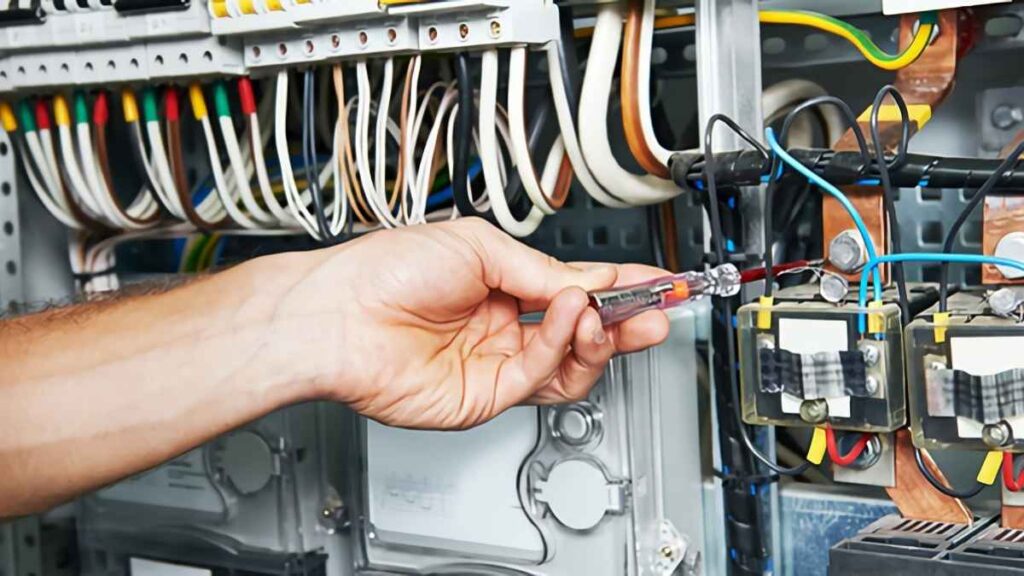The average salary of an electrician salary in California is about $29.47 per hour California. Electrician Salary in California is used to calculate on an hourly basis only instead of the type of work done. Whatever the work is done, the electrical work is calculated on an hourly basis only. Reports show that electricians gain a salary of about $64,260 per year. If the electricians in California are highly skilled and able to carry out all the electrical work, the salary could be $69,956 per year, about $33.64 per hour.
According to the Bureau of Labor Statistics, a practicing electrician can make $36,050 – $116,840 for a year. The electrician positions vary from apprentices, journeymen, and masters. Similarly, the salary also varied according to their knowledge and skill.
The major criteria that are considered in fixing the electrician salary in California are based on factors such as education, certifications, additional skills, and years of experience in the profession.
The electrician needs to do a wide range of work, including inspection, repairs, installation, and maintenance of the electrical system. So the electrician’s salary may vary according to their type of work as per their knowledge and experience.
Electrician Salary in California?

Electrician Career Specializations in California
- Automotive Electricians – The main responsibilities of Automotive Electricians in California include installing, maintaining, and testing electrical and electronic systems for vehicles.
- Aviation Electricians – Aviation Electricians use their skills in various aircraft of all sizes and types to install, test, repair, and maintain specific aspects of the aviation industry. They are mainly employed with aircraft manufacturers or airline companies.
- Building Automation System (BAS) Technician – Building Automation Systems account for a majority of today’s complex building infrastructure and are designed to address many different aspects like the electrical, plumbing, and mechanical fields. Electrical Technicians build, install, and usually maintain their compatible systems.
- Commercial Electrician – For example, installing, upgrading, troubleshooting, and fixing electrical systems in industrial plants is a job for commercial electricians.
- Electrical Inspectors – Electrical inspectors ensure safety and efficiency are met by checking the quality and compliance with valid building codes related to critical areas of electrical usage in everything from HVAC and light systems to major appliance projects.
- Industrial Electrician – Industrial electrician work includes everything from wiring power sources to oil and gas extraction equipment. Executing their duties, they can improve productivity in their assigned job by integrating machines with sensors and telemetry devices.
- Low Voltage – These electricians are highly specialized, so they usually work in and around commercial and residential buildings. They repair and upgrade existing systems as well as install new low-voltage systems.
- Marine Electricians – Marine electricians install and maintain the wiring and electrical systems on ships and boats.
- Outside Linemen – Outside linemen are diverse in terms of their presence across the economy. The highly skilled construction outside lineman is usually hired as part of on-site project teams, to accommodate an expedited schedule or lead times.
- Power Station and Substation Technician – The power station and substation technicians are the people who fix power stations, transformers, wireless hub stations, transformers, and switch gears.
- Residential Electrician – Residential Electricians need to know when to turn down the work as new systems are installed. Electrical wiring or repairs must be done along with inspection and maintenance, given changing codes and building specifications.
- Security and Fire Alarm System Technician – As a security or fire alarm technician you have duties such as installing, monitoring, repairing, and troubleshooting electrical alarm systems.
- Signs Specialist Electrician – Over at Signs Specialist, electricians can specialize in outdoor electric sign and billboard lighting installation, upgrades, repairs, and maintenance.
- Solar Technician – The solar technician organizes, project, and maintain arrays of solar panels.
- Telecommunications Line Installer – Telecommunications line installers are responsible for installing and repairing all sorts of communication cables, both inside and outside of buildings.
- Wind Turbine Electrician – Wind turbine electricians assemble, wire, and maintain tower and turbine assemblies that generate clean wind power.
Designation of The Electricians in California
- Apprentice
- Journeyman
- Master Electrician
In recent times, surveys show that the electrician’s salary in California is about $53,314 per year, approximately $25.63 per hour. The average wage is about $25.63 per day $960 per week, and $4161 per month.
In California, people are more aware of using solar power and wind power for electricity. This raises the electrician’s salary in California more. For installing the solar panel, the electrician is charging some additional charges. So it is clear the next decade, electricians can earn a high salary by installing alternative power like solar if they possess enough knowledge and skill.
California government had planned to construct many buildings for administration purposes, and many privatized buildings and corporate offices are in the plan, which seems to require an electrician at large.
Here are some classifications of average electrician salary in California
- Avionics technician: $35,935 per year.
- Commercial electrician: $39,935 per year.
- Marine technician: $45,052 per year.
- Wind turbine technician: $50,174 per year.
- Electrical technician: $51,727 per year.
- Maintenance electrician: $53,352 per year.
- Electrical foreman: $53,352 per year.





